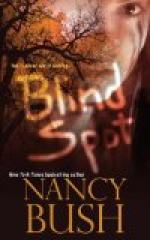I lay still for a minute, thinking. Ah, yes! It came back. Watson—Chick Watson! The Blind Spot! The Rhamda and the bell!
Surely it was a dream. How could all this be in one short night? It was like a nightmare and impossible. I raised up on my elbow and looked at the form beside me. It was Hobart Fenton. He was unconscious.
For a moment my mind was whirring; I was too weak and unsteady. I dropped back and wondered absently at the roses. Roses meant perfume, and perfume meant a woman. What could—something touched my face—something soft; it plucked tenderly at my tangled hair and drew it away from my forehead. It was the hand of a woman!
“You poor, foolish boy! You foolish boy!”
Somewhere I had heard that voice; it held a touch of sadness; it was familiar; it was soft and silken like music that might have been woven out of the moonbeams. Who was it that always made me think of moonbeams? I lay still, thinking.
“He dared; he dared; he dared!” she was saying. “As if there were not two! He shall pay for this! Am I to be a plaything? You poor boy!”
Then I remembered. I looked up. It was the Nervina. She was stooping over with my head against her. How beautiful her eyes were! In their depths was a pathos and a tenderness that was past a woman’s, the same slight droop at the corners of the mouth, and the wistfulness; her features were relaxed like a mother’s—a wondrous sweetness and pity.
“Harry,” she asked, “where is Watson? Did he go?”
I nodded.
“Into the Blind Spot?”
“Yes. What is the Blind Spot?”
She ignored the question.
“I am sorry” she answered. “So sorry. I would have saved him. And the Rhamda; was he here, too?”
I nodded. Her eyes flashed wickedly.
“And—and you—tell me, did you fight with the Rhamda? You—”
“It was Watson,” I interrupted. “This Rhamda is behind it all. He is the villain. He can fight like a tiger; whoever he is he can fight.”
She frowned slightly; she shook her head.
“You young men,” she said. “You young men! You are all alike! Why must it be? I am so sorry. And you fought with the Rhamda? You could not overcome him, of course. But tell me, how could you resist him? What did you do?”
What did she mean? I had felt his flesh and muscle. He was a man. Why could he not be conquered—not be resisted?
“I don’t understand,” I answered. “He is a man. I fought him. He was here. Let him account for Watson. We fought alone at first, until he tried to throw me into this Thing. Then Hobart stepped in. Once I thought we had him, but he was too slippery. He came near putting us both in. I don’t know. Something happened—a bell.”
Her hand was on my arm, she clutched it tightly, she swallowed hard; in her eyes flashed the fire that I had noticed once before, the softness died out, and their glint was almost terrible.




